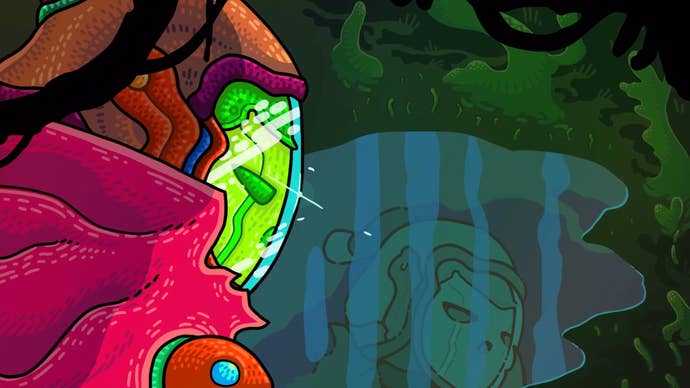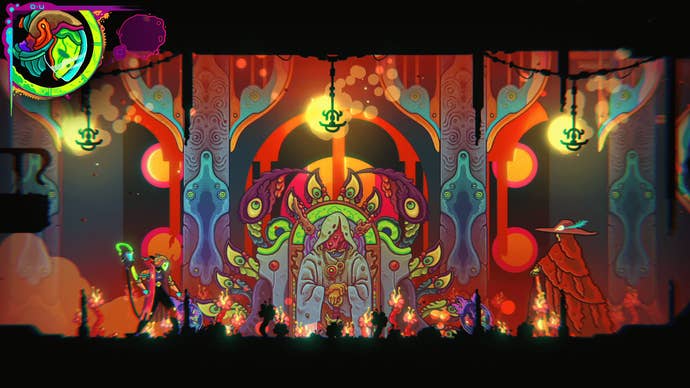Products You May Like
Have you ever eaten a meal that just… shouldn’t have been? Like, on the plate, it all made sense; you had your protein, your greens, your carbs, maybe a dressing or sauce. A meal you’ve eaten 1000 times before in your life. But something about it – maybe it was the sesame oil over the wilted kale, maybe it was the gochujang sauce seared onto rendered fat of the pork belly, maybe it was the hard, chewy crispy onion mixing into the soft, yielding texture of the rice – made it the best damn meal you’ve ever eaten.
Ultros is like that, a buffet of sumptuous ingredients all handled with artisanal care, prepared and organised into a delectable feast – moreish and maddening, and so, so much more than the sum of its parts. Equal parts action, exploration, and philosophical lecture, Ultros is the kind of game you can only play for the first time once. And I’m already upset I’ve used my first go up.
Ultros is the best Metroidvania I’ve played since Hollow Knight. But that’s only one aspect of what it is. This trippy labyrinth of interconnected tunnels and tapestries has that special catnip effect that the best in the genre have perfected (Hollow Knight, Axiom Verge, Guacamelee, and so on) whilst also layering in a combat system that makes its peers look bland and tasteless by comparison.
And I think it’s to do with overstimulation. Some of us masochists like our games to pound us over the head with blunt-force trauma; a skill-check boss or a bastard of a platforming section to block us until we learn. Others yet prefer obtuse path-setting or cranium-busting puzzles. Ultros’ flavour of sadism is different, though, and relies on overstimulating you, rather than physically pushing you to the edge.
Just take a look at the trailers or screens of this page. Niklas “El Huervo” Akerblad, the eyes and hands behind the art of Hotline Miami, is responsible for this extended mushroom trip. Everything sweats neon, everything is too bright, even reading what is a background asset and what is a threat can be hard – but it’s all so lush. If you’ve ever dosed psilocybin, you’ll instantly recognise the undulating, beating organs of this living spaceship. And if you’ve not, well, this is as good a crash course as you’re going to get before the stomach aches set in.
You don’t know what El Huervo has drawn to be a forgettable passing curio, and what was created to portray a threat. You might think that sounds kinda horrible, and it is, but it’s like eating kimchi for the first time: you scoff, you baulk, you shake your head… and then you go back in for another bite. There’s something compelling about it. Something new. Something unusual. We’re a long way from the brown-and-green palette of the Xbox 360 generation here, and that’s wonderful.

When you do parse threats from theatre, you’ll be drawn into a flowing, elegant sting of combat that’s designed to make you think about absolutely every input you make. More or less everything you kill in Ultros can be eaten, and the cleaner you butcher the insectoid machinations that roam the 2D halls, the better the quality of ingredient you can chow down on. That means mindlessly hacking at something (using the same combo more than once) degrades the quality of the food. If you want a prime cut of mantis mandible, you need to use all the moves at your disposal.
This system speaks to me. I want it in every game. I want it in Monster Hunter, in Devil May Cry, in whatever the hell Final Fantasy 17 looks like. It takes everything beautiful about the roguelite and Metroidvania loop and distils it into about 10 seconds of combat; mixing your ability to master your player character with a distinct understanding of the world and the threats you face.
Given that you can only explore and battle a certain amount before the world resets (and only a few things persist between loops), Ultros makes you think – hard – about what you engage, and how you engage it. Each loop, your mysterious main character (a Samus analogue in her own way) is reborn. You crawl into the world naked, no skills or levels following you out of the sticky, gooey womb you keep finding yourself in.

And to learn (or remember) how to do stuff, you need to eat. Just like in real life, if you think about it. Better quality food has better nutrition, and so honing your hunter instinct every loop means you can level up faster, and explore deeper, as you work through the cycle. You can ‘lock’ some skills into place – all hail the Wall Jump – but largely you need to start thinking about what you need, and what you don’t. As you’re reborn, you shed baggage and optimise growth. There’s something quite yogic about that, right? Something karmic, and important.
And that’s the vibe of Ultros, through and through. Yes, the whole game might look like it’s going to give you dilated pupils and a dicky tummy, but the commitment to mind expansion and self-discovery goes further than a pair of parachute pants and a mandala throw on the wall. The solution to your problems in Ultros is sometimes, simply, wait. How many games do that? Make coming back later an actual mechanic? It’s bizarre, it’s batshit, it’s brilliant. Other times, you need to think carefully about the precious seeds you’ve picked up from some secret, cultivated garden deep in the bowels of the ship – which of the plants you’ve encountered will grow in just the right way to gum up these gears or provide you with a shield from some hot, horrible daggers?
So much of Ultros’ appeal is in how organic it is; how organic its world, how organic its path-finding, how organic its message. There’s even a thread in this game that’s anti-violence, that suggests maybe – just maybe – if you don’t kill everything you see, something good might happen. It’s not the first game to suggest putting your sword down and picking up a trowel, by any means, but I think it might be the most successful at explaining why you should.
Ultros is out now on PS4, PS5, and PC. There is a free demo available on Steam. This article was written thanks to a PS5 code provided by the publisher.
